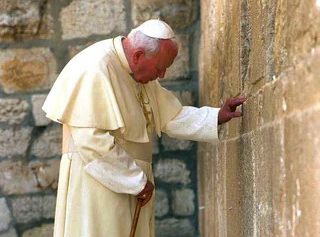Catholic Social Teaching and Antisemitism: A Call to Action for Every Catholic
by CAPP-USA
“Antisemitism is a sin against God.” (Pope Francis)
Catholic Social Teaching (CST) calls Catholics to form their consciences and oppose every injustice that violates the dignity of the human person made in the image of God.
Antisemitism is one such grave injustice, striking at the heart of our faith’s call to love and solidarity. (Catechism of the Catholic Church, 1929)
What is Antisemitism?

Antisemitism is foreign to the mind of Christ and has no place in Christianity.
Antisemitism is hostility, prejudice, or discrimination against Jews—whether as individuals or as a community.
It can manifest in both overt and subtle ways:
Overt forms:
- Verbal attacks – slurs, stereotypes
- Violence – physical harm, vandalism
- Exclusion – social or institutional
- Economic marginalization
- Discriminatory policies
Subtle forms of antisemitism include: Microaggressions – dismissive remarks, coded language; Scapegoating – blaming Jews for societal problems, and; Conspiracy theories – myths about Jewish power or influence.
CST condemns all such acts as violations of human dignity, recognizing their interconnectedness with other forms of prejudice like racism and xenophobia.
A Growing Crisis in the U.S.
Antisemitism is not a relic of history—it is a present and rising threat:
- 2024 incidents: up 5% from 2023
- 5-year rise: up 344%
- Decade rise: up 893% — the highest in 46 years of ADL tracking
- Jews are 2.4% of U.S. population but:
- 16% of all hate-crime victims
- 70% of religion-based hate-crime victims (ADL — FBI Report) (Audit of Antisemitic Incidents 2024)
Campus antisemitism in 2024–2025—including harassment, vandalism, and exclusion—has made the urgency of action impossible to ignore.
Globally, antisemitism is surging, with notable increases in Europe and the Middle East, prompting Pope Francis’ condemnation of rising anti-Jewish sentiment. (Address to a Delegation of The Conference of Jewish Rabbis)
Acknowledging the Church’s History
The Catholic Church has acknowledged its “tormented relationship” with the Jewish people, where historical teachings and actions—such as medieval restrictions on Jewish communities or rhetoric blaming Jews for Christ’s death—sometimes fostered anti-Jewish sentiment, contradicting CST’s principles. (Memory and Reconciliation: The Church and the Faults of the Past, 5.4.)
The “Hidden Encyclical”
In 1938, Pope Pius XI ordered the preparation of an encyclical intended to condemn Nazi racial ideology as incompatible with Christian faith. The draft, Humani Generis Unitas, included a substantial section on antisemitism, offering a theological argument against discrimination and persecution of Jews. At the time of Pius XI’s death in February 1939, the completed draft reportedly lay on his desk.
Although Humani Generis Unitas — often referred to as the “Hidden Encyclical” — was never promulgated as an official magisterial document, it was intended to serve as a definitive Catholic condemnation of racism and antisemitism. Unlike earlier Church statements, it explicitly names and condemns the persecution of Jews.
Specifically, the draft addresses:
- The “Jewish Question”: It acknowledges a long and complex historical relationship between the Church and Judaism, while insisting that such tensions can never justify racial hatred or systematic persecution.
- Condemnation of Violence: It unequivocally condemns the “persecutions and vexations” inflicted upon Jews.
- The Universal Call: It affirms that antisemitism is fundamentally incompatible with the spirit of the Church, echoing Pius XI’s famous declaration that “spiritually, we are all Semites.” (See: Council Of Centers On Jewish-Christian Relations)
Turning Point: 1965
In 1965’s Nostra Aetate the Church:
- Rejected the idea of collective Jewish guilt for Jesus’ death
- Affirmed the enduring covenant between God and the Jewish people
- Called for “mutual respect and knowledge” between Catholics and Jews
Since then, the Church has made strides toward reconciliation, including papal visits to synagogues and Israel and interfaith initiatives, but the work of healing continues.
Jews and Christians: A Shared Bond
Recognizing that Solidarity is a pillar of CST the Church teaches that Jews are “our beloved brothers.” (Pope St. John Paul II, 4)
- “Inside every Christian is a Jew”. (Pope Francis)
- “Our two religious communities are connected at the very level of their identities.” (Pope St. John Paul II)
- “We share Abraham, Moses and the Prophets.” (Pope Benedict XVI)
- “Because of the Jewish roots of Christianity, all Christians have a special relationship with Judaism.” (Pope Leo XIV)
What Can Catholics Do?
To live out CST, every Catholic is called to act against antisemitism with courage and love. Here are seven practical steps:
- Form Consciences: Study Jewish history, theology, and contributions to dispel myths and stereotypes. Read Nostra Aetate, or the U.S. Conference of Catholic Bishops’ resources on Catholic-Jewish relations. “Christians must strive to acquire a better knowledge of the religious tradition of Judaism”. (Pope St. John Paul II)
- Engage in Dialogue: Join or initiate Catholic-Jewish councils, attend interfaith events, or partner with organizations like the American Jewish Committee or local synagogues. Host a dialogue series in your parish to foster mutual understanding and build relationships.
- Reject Hatred: Speak out against antisemitic remarks, report incidents to authorities, and advocate for policies protecting religious minorities. “All forms of discrimination must be firmly opposed.” (The Church and Racism, 33)
- Examine Consciences: Reflect on personal biases and the Church’s historical role in antisemitism. Ask: Do my words and actions uphold the dignity of my Jewish brothers and sisters? “Christians must examine themselves on the responsibility which they too have for the evils of our time.” (Pope St. John Paul II)
- Promote Evangelization: Advocate for antisemitism awareness in Catholic schools, seminaries, and youth programs. Encourage curricula that highlight Jewish contributions, the Holocaust, and the Church’s commitment to reconciliation, ensuring young Catholics grow in solidarity. “The greatest work of charity is evangelization”. (Pope Benedict XVI, 3)
- Pray for Healing and Unity: Organize or join interfaith prayer services for peace and reconciliation, echoing Pope Francis’ plea: “Never again, Lord, never again!” (Fratelli Tutti, 247)
- Act Locally: Live CST’s principle of subsidiarity by starting small: form a Nostra Aetate study group; co-sponsor service projects with Jewish communities (e.g., joint food drives); invite a rabbi to speak at your parish. Small actions ripple outward.
Final Word

Pope St. John Paul II prays at the Western Wall in Jerusalem during his visit in 2000.
Antisemitism strikes at the heart of Catholic Social Teaching—human dignity, solidarity, and the common good. To reject it is not simply to defend our Jewish brothers and sisters. It is to defend the Gospel itself.
Let our faith be known not only by the words we profess, but by the love we live.
In 2000, Pope St. John Paul II, standing before the Western Wall in Jerusalem, asked God’s forgiveness for the Church’s past sins and pledged to build a future of “authentic brotherhood with the people of the Covenant.”





